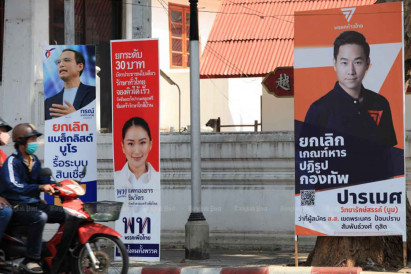
The Move Forward Party (MFP) must challenge the Pheu Thai Party’s ambition to score an election landslide victory and rethink its campaign strategy to stay relevant and attract more votes, according to Piyabutr Saengkanokkul, secretary-general of the Progressive Movement (PM).
In his latest Facebook post, Mr Piyabutr wrote that Pheu Thai’s landslide motto was catching on in many constituencies, judging from several opinion polls favouring the party and Paetongtarn “Ung-Ing” Shinawatra, its chief adviser on public participation and innovation, who is also Pheu Thai’s presumptive prime ministerial candidate.
Mr Piyabutr, the law academic who co-founded the Future Forward Party (FFP) dissolved over an illegal loan and subsequently co-founded the MFP, said the Nida Poll has compared the MFP to a glass full of water with a support base that neither shrinks nor expands.
The MFP survives on the votes of its aficionado supporters. But if it wants to grow in the next election, it must tap into the pool of voters currently undecided over what party to vote for and convince them to cast their ballots for the MFP.
To achieve this, the party must tackle the Pheu Thai’s landslide platform, Mr Piyabutr said.
He said a vast number of Pheu Thai supporters also agree with many policies that the MFP strongly advocates.
However, they tend to want to vote for Pheu Thai because they reckon the MFP stands little chance of winning decisively in the next poll and forming a government on its own or leading a coalition government.
The best that can happen, he said, is that some voters might vote for Pheu Thai’s constituency candidates and cast their party list ballots for the MFP. Splitting votes is made possible by the change in the election system from the single ballot in the previous poll in 2019 to the dual ballots.
Mr Piyabutr predicted if such split-votes were a reality in the next poll, the MFP would walk away with far fewer constituency MPs and capture no more than 30 list MPs.
In the previous election, the then FFP won 81 MP seats, becoming the third biggest party. Of that number, 50 were list MPs.
He added the MFP might see the merit in the split votes and choose to do nothing to avert it. It might even count on a degree of “mercy” should the Pheu Thai invite it to be a coalition partner and manage some cabinet portfolios.
But if the MFP wishes to expand, the party must show voters it has what it takes to compete with Pheu Thai and emerge from the next poll as the biggest party, continued Mr Piyabutr.
“The MFP must demonstrate to voters it is not an underdog. It must make them believe every vote given to the party is not wasted but would help it win the election,” he said.
Mr Piyabutr suggested the MFP rethink their campaign narrative by shifting away from that of the “pro-democracy camp against dictators” to “old power pitted against the new power” represented by the MFP.
This would give the party a chance to break new ground and offer hope of easing the longstanding conflict that has arise from the deep social and political divides caused by the highly polarising time in office of former premier Thaksin Shinawatra and similarly Prime Minister Prayut Chan-o-cha who succeeded him.

